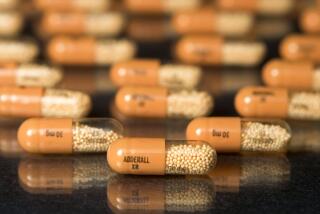As parents wait, doctors debate ADHD drugs
- Share via
When a panel of medical experts voted last month to recommend a safety warning on medications used to treat attention-deficit hyperactivity disorder, Dr. Adelaide Robb could have predicted the public’s response: panic.
The government-appointed panel’s conclusion -- that the drugs may increase the risk of sudden cardiac death -- hit the newspapers on a Friday morning.
“By Monday morning, we were getting phone calls from parents who said things like ‘I threw the medicine down the toilet, and now my kid is out of control,’ ” says Robb, a child and adolescent psychiatrist at Children’s National Medical Center in Washington, D.C.
“There was so much misinformation and fear.”
Experts such as Robb, as well as parents of kids with ADHD and many adults who take the medications, are hoping for a more reassuring word from a different group of medical experts who on Wednesday in Washington will take up the cardiac safety issue once again.
The committee that convened last month was composed mostly of experts in heart disease who had met to discuss reports of sudden cardiac events linked to ADHD medications.
Between 1999 and 2003, 25 people had died suddenly, and 54 suffered serious cardiac events such as a stroke, heart attack, hypertension or arrhythmia, while taking the medications. Nineteen of the deaths were among children and teenagers.
The experts had been asked to advise the Food and Drug Administration on how to study the potential risk, but they stunned observers by criticizing, instead, the number of prescriptions written to treat ADHD and voting 8 to 7 to recommend the medications carry a black box warning on the risk of cardiovascular problems or death.
A black box warning is the strictest safety warning imposed on prescription drugs and often results in a decline in prescriptions written for a product.
Most experts agree that the potential cardiac risk in children and adults, and other possible risks, should be studied. The drugs can increase blood pressure and may be riskier in adults with heart disease, or children with structural heart defects.
But some feel the committee overstepped its mandate.
“This particular FDA committee had really gone beyond their bounds and, in a sense, became a renegade committee,” says Dr. Andrew Adesman, chief of developmental and behavioral pediatrics at Schneider Children’s Hospital in Lake Success, N.Y. “They took it upon themselves to make this black box warning.”
The discussion may unfold differently at the Wednesday meeting, in which a pediatric advisory committee will discuss safety issues, including the potential cardiac risk as well as a possible risk of suicidal thinking associated with some ADHD drugs.
At issue is whether the deaths and cardiac events among ADHD users are clearly linked to the medications.
About 2.5 million children and teens take ADHD medications. Most of the drugs contain methylphenidate, found in Ritalin and Concerta and many generic ADHD medications. An estimated 1 million adults also take the medications, which can help children and adults focus and control restlessness and fidgeting.
But no one is sure whether the number of cardiac problems reported to the FDA is unusual, Adesman says. The rate of such problems in these children taking ADHD medications appears to be no higher than among children in the general population.
“We don’t have any data to suggest that the rate of serious adverse events is increased with these medications,” he says.
Uncertainty over risks
Moreover, some experts say, it’s unclear whether the people who died had other cardiac risk factors or were taking other medications that could have played a role in their deaths.
Some committee members who voted for the warning explained they wanted the public to know there is uncertainty surrounding a cardiac risk. One panel member, Dr. Steven Nissen, a respected cardiologist at the Cleveland Clinic and the new president of the American College of Cardiology, also noted during the hearing that he thinks ADHD medications are overprescribed.
But, says Robb: “Dr. Nissen is not a psychiatrist, doesn’t know anything about ADHD and doesn’t treat kids.”
Dr. Leonard Sax, a family physician and psychologist who has studied ADHD prescribing patterns, says the debate surrounding overuse of the drugs is a legitimate one. Sax thinks the medications are too often doled out to young children, especially boys, who are not developmentally ready for the rigors of today’s kindergarten and first-grade curricula.
“Too often these drugs are used for behavioral control, not to treat real ADHD,” says Sax, who practices in Montgomery County, Md.
Still, he says, this is a separate issue from the question of adverse events, and the February panel meeting was not the right forum for discussing it. “Calling attention to the extraordinarily rare cardiovascular consequences to get at [over-prescribing] is muddling the issue,” he says.
Methylphenidate has been in use for more than 50 years with good success, and its benefits have been noted in more than 200 studies, says Dr. Laurence Greenhill, a child psychiatrist and chairman of a committee appointed to study the issue by the American Academy of Child and Adolescent Psychiatry.
Studies show that medication, along with behavior and cognitive therapy and a supportive school environment, is often the best strategy to treat the disorder.
Research also shows that children and teens with ADHD who are not treated have a higher risk of failing school and of engaging in criminal behavior, and have more trouble making and keeping friends.
The FDA may agree to another recommendation made by last month’s advisory committee to provide an informational booklet on safety issues with all ADHD medications. However, an FDA official expressed doubts about the wisdom of the black box recommendation.
“We don’t usually write a black box for something there isn’t pretty good evidence for,” said Dr. Robert Temple of the FDA’s Office of Medical Policy.
Some doctors say the controversy is regrettable.
“Now you have 2.5 million parents worrying about something where there is probably no reason for them to be worrying,” Adesman says. “Physicians throughout the country were flooded with phone calls. And there are families who, despite reassurances from their physician, will have unnecessary cardiac evaluations or will take their kids off the medications.”
Nancy Starke was among the worried parents. When she heard about the cardiac risk, she dashed off an e-mail to her daughter’s doctor.
“It alarmed me,” says Starke, who lives in Los Angeles. “But I also thought there was probably more to the story.”
Starke’s daughter’s doctor reassured her that the risk, if it even exists, is extremely low. That’s good news, Starke says. “The medication makes her so much more productive and helps her attitude.”
Teri Burley, the mother of two teenage sons with ADHD, took a deep breath when she heard the news. But, as a leader with a local chapter of the nonprofit support group Children and Adults with Attention Deficit/Hyperactivity Disorder, Burley says she has learned to do her own research.
“I get on the Internet and look for information,” the Placentia woman says. “I call doctors. I get second and third opinions. Sometimes I call drug companies and ask for more information. I try to do the research and then make a choice.”
Burley opted to keep her sons on medication. “I think the risk is very slim and that the benefits outweigh the drawbacks. And no medication is perfect.”
Many parents are initially reluctant to put their kids on stimulant medications and remain uneasy about the treatment, Robb says. The current controversy may add to their hesitation.
“It also scares people from coming in for treatment,” she says. “Instead they don’t do anything and the kids continue to struggle.”
*
(BEGIN TEXT OF INFOBOX)
A medication used to treat the sleep disorder narcolepsy may soon be approved to treat attention-deficit hyperactivity disorder.
A Food and Drug Administration advisory committee will review the safety and effectiveness of the drug, which is known by the generic name modafinil, at a hearing Thursday.
Cephalon, the maker of modafinil, now sells the medication under the brand name Provigil for narcolepsy, which is an extreme tendency to fall asleep during normal daytime activities. But studies have shown that the medication also helps people with ADHD.
In a report published in the December issue of the journal Pediatrics, children and adolescents taking the medication in a randomized, double-blind study showed significant improvement in such symptoms as inattention, impulsivity and hyperactivity.
About 48% of the patients taking the medication were rated as “much” or “very much” improved by their doctors compared with 17% of the patients taking a placebo. The drug did cause side effects in some children, including insomnia and decreased appetite, according to Dr. Joseph Biederman, lead author of the study and professor of psychiatry at Harvard Medical School.
If approved for treating ADHD, the drug would be sold under the name Sparlon. The medication is a stimulant but is chemically different than Ritalin, which is a brand name for the generic drug methylphenidate.
*
-- Shari Roan
More to Read
Sign up for Essential California
The most important California stories and recommendations in your inbox every morning.
You may occasionally receive promotional content from the Los Angeles Times.










